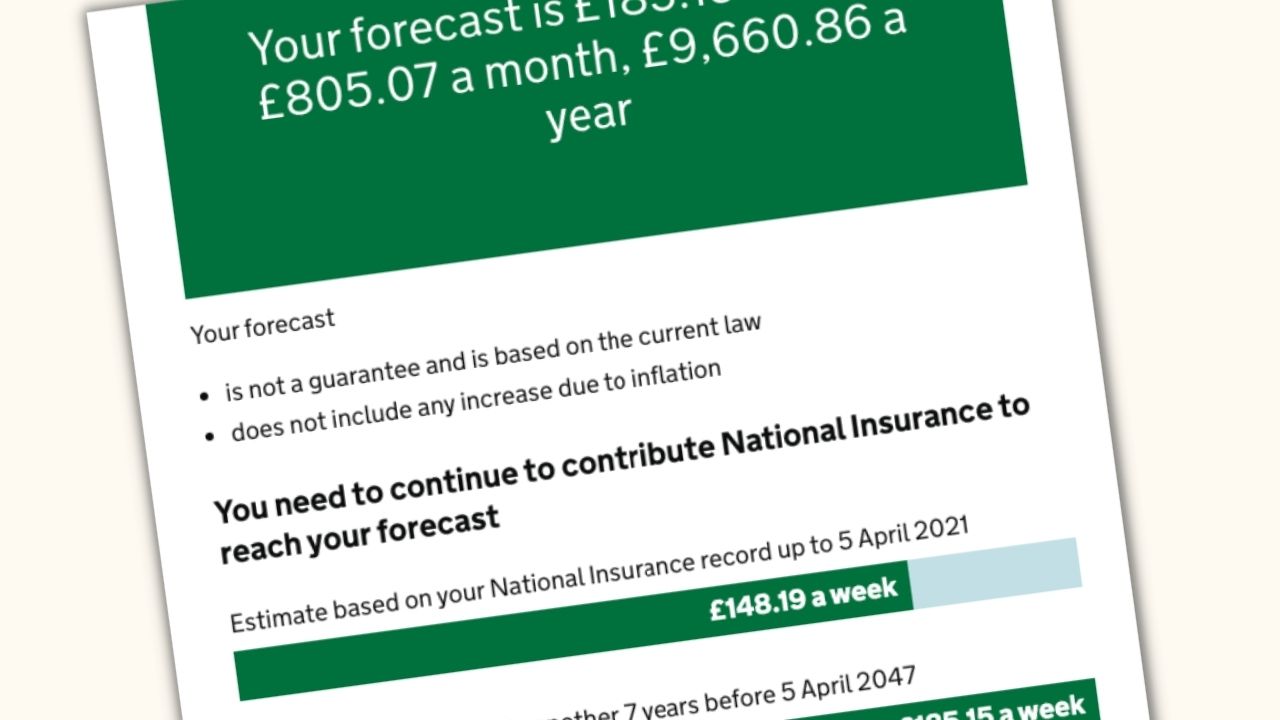Here’s how the State Pension works and how to get the full amount
Your State Pension is a regular payment paid out by the Government once you’ve hit your State Pension age (which is currently 66 but is slowly increasing). It could allow you to stop working earlier or wind down the amount you work in later years.
You might think that it’s pointless to care about it until you’re approaching retirement, but there are important questions you should ask, such as how much you’ll get, what age you’d be getting it, and whether you’re even eligible.

When can you get the State Pension?
To start, let’s go back to basics. The State Pension is a guaranteed weekly income paid to you when you reach the State Pension age. You can, of course, retire earlier if you have other income sources or other pensions, but you don’t get this cash until you hit the State Pension age.
The State Pension age is 66 and it’ll keep rising — first to 67 between 2026 and 2028, impacting those born after 1960 and then to 68 years old. This latter change is meant to happen around 2044 (adding a year for those born around 1977) but could occur up to 10 years earlier between 2035 and 2039 (meaning those born after 1968).
Though of course, these ages could – and probably will – change again. I imagine I’ll be 69 when my time comes. And, it’s anticipated that anyone currently under 30 will have to wait until 70 years old to get the payments. Indeed, in 30 years there might not even be a State Pension at all anymore!
How to find out your State Pension age
The way to find out what the date will be (as things stand now) is for you is to use the State Pension age tool on the Gov.UK website.
You simply enter your date of birth and whether you’re male or female (gender only makes a difference to people already in their mid-60s) and ta-da, you’ll see your State Pension age.
Quick note – as the earlier increase to 68 is just a proposal it’s not been factored into the calculator, so add a year if you were born after 1968 to be on the safe side.
Why you should care about your State Pension now
So you now know when you’ll get it, and it could well be a long time until you reach State Pension age. Hey, for me it’s at least another 25 years! So we can forget about it until then, right?
No – there are important reasons I care now, and you should too.
It reduces how much you’ll need in your other pensions
The full amount from the State Pension might not seem much – currently just £221.20* a week and going up to £230.30 per week in April 2025.
That’s £11,502.40 per year until you die (or £11,975.60 after April 2025). If you live for 20 years after your State Pension age then it’s worth more than £230,000.
Say you’ve worked out you need £30,000 a year to live when you retire, the full State Pension means you’ll only actually need to save enough to cover £18,000 a year from your State Pension Age. That’s a much easier (and less scary) total to target.
* How much you get can get a little complicated so this is the most. I won’t go into detail here but you’ll get less if you ever “contracted out”. Or if you would have been better off under the older system, it’s possible you might get small top-ups when you retire.
You’re not automatically entitled to it
But, you don’t automatically qualify for the State Pension. You might think it just starts when you hit the State Pension age, but you’re wrong. You need to make at least 10 years of National Insurance contributions to qualify. Less than this and you won’t get anything.
You generally make National Insurance contributions through your pay, or you might get National Insurance credits through things like child benefit, jobseekers allowance, carers allowance and maternity leave.
You might not get the full amount
That 10-year figure is the minimum. You’ll need as many as 35 years of National Insurance contributions to get the full amount. But, depending on your age, it could be a little less – more on this later. It’s well worth making sure you have made or will make enough contributions to reach this number.
If you only qualify for two-thirds of the full amount (roughly what you’d get if you only made 24 out of 35 years of full contributions) then you’d be around £3,900 worse off a year. That will make a difference.
I’ve detailed further down the article how you can check your current status and how much you’d get (at current figures).
Our podcast
Listen to Cash Chats, our award-winning podcast, presented by Editor-at-Large Andy Webb and Deputy Editor Amelia Murray.
Episodes every Thursday.

You might have missed some years
If you’ve been working or on certain benefits each year since school or University (or even before) then it’s likely you’ll have each year so far marked on your record as full. But if for any reason you took time out – a gap year perhaps – you’ll have a missing year.
And the closer you get to retirement, the bigger the impact any missed year will have on how much you get. But if the missed year is within the last six years you can voluntarily pay to top it up.
Of course, if you’ve got plenty of years to catch up you might not need to do this, but it’s worth thinking about if you’re approaching the time you’d like to stop working.
You won’t want to be making future contributions if you retire early
Do you want to keep working until you actually reach the State Pension age? If you can afford to retire earlier it makes sense to ensure you don’t have to keep making (voluntary) contributions when your income is low, in order to get the max State Pension available to you.
Say you’re aiming to quit in 10 years at 55 years old but have 23 years of contributions so far. You’ll either need to change your goal to 57 years old, or you’ll need to make voluntary contributions for another 2 years to reach the magic number of 35 years of contributions.
 Featured switching deal
Featured switching deal
 Customer rating
3.8/5
Customer rating
3.8/5
- Switch bonus£200
- Offer endsFree gift card ends 27 February
- Extra bonus£25 Amazon Gift Card
- FSCS Protected? Yes
- Switch bonus requirements Switch using the Current Account Switch Service and close your old account within 60 days of starting the switch
- Deposit requirements Deposit £1,500 in the first 60 days from opening the account
- Direct debits transferred over Set up two Direct Debits before or after the switch from a selected list of household bills
- Existing customers? Can't have held any Santander current account on 1 January 2025
- Restrictions Can't have received a switching bonus from Santander already, offer limited to once per person
- Eligible accounts Open a new or hold an existing Everyday, Edge, Edge Up or Edge Explorer current account
- £25 Amazon Gift Card requirements To qualify for the gift card, you need to complete a full switch using CASS, and make five debit card transactions within 30 days of opening the account. Offer ends 3pm 27 February 2026
How many qualifying years do you need?
Under the new system (introduced in April 2016), you qualify for the State Pension after 10 years of contributions and will get the full rate after 35 years of contributions (this is for men born after 1951 and women born after 1953).
But as I mentioned above, it’s not going to be 35 years for everyone – it could actually be less. This is despite pretty much every major newspaper and personal finance website stating it’s now 35 years for everyone. It’s not! And I’m proof of this.
If you started making contributions before April 2016, which is going to be most people in their late 20s and some younger – the total number of years is based on a mix of the new and old systems.
For me, I only need to make a total of 30 years of full National Insurance contributions. For my wife, it’s 32 years. This is despite the fact we’ve both already contributed the same number of years so far.
A few years ago I called up the HMRC helpline to find out why this was and why so many sources reported a blanket 35 years. The answer wasn’t massively clear, but it might be down to me being a little older than her, or me earning more in some of those years. Whatever the reason, we’re both examples of people who need to pay less than 35 years – so it could well be the same for you.
Get the best of our money saving content every week, straight to your inbox
Plus, new Quidco customers get a high paying £18 welcome offer

How to check your State Pension record
There’s a way to check how much State Pension you’ll get when you retire, based on your current record and also if you continue paying in. You’ll also be able to see if there are any gaps.
It’s a five-minute job well worth doing so you know if you’re on track, or whether you need to take action now – and if you’re over 40 you may well need to fill in any missing gaps.
You need to request a State Pension forecast. It’s easy and doesn’t take long. You need a Government Gateway ID, and it might take five to 10 minutes to set this up. You need to validate your identity using your passport or a recent payslip, but once sorted you can find out how many years you still need to contribute to get the full amount.
In the same system, you can check your National Insurance record. You’ll see how many years you’ve already made full contributions. Add those figures and you’ll get the total number of years that you need to pay.
This page will also tell you how many more years you have left to make contributions – i.e. before you reach the State Pension age.
See if you can top-up your State Pension
Though you’ll keep gaining qualifying years when you work or claim certain benefits, you can also pay money now to fill in some gaps. This is meant to be limited to the past six years, but an increased time frame has been extended a few times.
You’ve got until 05 April 2025 (extended from the original 5 April 2023 deadline) to make back payments. This extension is for men born since April 1951 and women after April 1953. If that’s you, you can top up as far back as April 2006.
There’s a cost to any top-up – roughly £824 per full year if you do it in 2025. This is a sizeable amount, but for each year you add now, you’ll break even if you claim the State Pension for at least three years. So claim it for four years and you’ll be better off.
If you’re self-employed, then you’ll need to pay less per missing year to make it a qualifying credit. There are different rates for this.
Broadly, this isn’t going to be worth it for those under the age of 45, and probably a good few years after that. But the closer you get to state retirement age, the more likely it is you could benefit from a top-up rather than missing out on the full amount or having to keep working for longer.
Of course, those who are able to get free credits from things like missing child benefit or other benefits, should make sure they claim those to help fill any gaps.
You’ll probably want to contact the Future Pension Service on 0800 731 0175 before making any overpayments as they can advise on whether you need to. There have been huge backlogs and delays getting through (hence the extensions), so keep trying.
Alternatively, if you’re sure you want to go ahead, some might be able to make the payments via their government gateway account – it’ll show as an option when you check your current NI record.






Hi Andy,
Can you do a video on what private pension apps are currently best?
Thanks a lot
Alex
If you only made 24 out of 35 full years of contributions then would you get 24 / 35 * £9660.86 a year? If you had x full years and x>=10 then would you get x / 35 * £9660.86 a year?
and x <=35
Hi Andy
How do we go about deciding how much we need to pay and then how do we pay any top-ups?
Hi Andy,
I’m 40 years old, so assuming that I will get my state pension from 2050 when I turn 68. This leaves me with 28 years to pay into the system to get my full state pension, having checked my pension summary it says that I need to contribute another 16 years before 5 April 2049 (having already 16 years of full NI contributions). I’ve got 2 years where my NI is not full. My question now is if I make up for those 2 years and pay in another 16 years (which would be 2038), am I running a risk that I ‘overpay’ from 2038 as I would be paying NI (assuming I’m still working then) but my state pension would not increase further (apart from inflation adjustments)?
Thanks in advance for any light you can shed on my query!
Best Regards,
Chris
No, I’d say if you think you’ll work those 16 years or be happy to voluntarily pay after this, you’ve plenty of time to reach it. Yes you’re right, if you pay more than the 35 (or however many years) required you don’t get any extra State Pension.
Hi Andy, I have 5 years missing on my record, due to ill health but I didn’t claim anything as I thought my husband was earning too much at the time. We didn’t consider at the time then impact it would have on my pension. I am unlikely to work again and was wondering if it was possible to set up a company, declare through self assessment earnings under 6K then voluntary pay N.I. at the reduced rate? Is this possible technically? Or is this fraud, unethical or just no, not a chance?
Hi Andy, I have paid my NI contributions for about 34 years with just a few months missing intermittently due to being unemployed on a few occasions. Once i have paid for 35 yesrs in total will i get some adjustment to my subsequent NI contributions ? Thanks
Hi Paul, no, you’ll keep paying them as normal until you stop working
Hi – does being on maternity leave or being part time after having children impact on whether your NI contributions have gaps?
Thanks due any info
I’m retired and receiving state pension. I had 37 years in NI but I don’t receive a full pension because I was contracted out. My pension forecasts just told me how many stamps I had and never mentioned that I might not get a full pension. I never saw my cope amount. I stopped working a few years before claiming my pension in 2016 and I asked DWP if I could make further contributions to achieve full pension but they said no, I could only make contributions going forwards, not backwards and didn’t give any explanation beyond this. I was surprised because I knew there was a 6 years back rule. Can I make contributions now under the extended rule? Will it depend on gaps in my record after 2006?
I am confused by what you said about how many years you and your wife have to contribute.
My forecast says I have 32 qualifying years, yet underneath that shows me another 7 years to contribute to get the full pension amount payable. I started work in 1985. So why isn’t it saying I only need another 3 years to get to 35 qualifying years? Or where do I find out if I have already paid enough?
Thanks for the brilliant articles. Very useful 😀
Richard.
Did you ever “contract out”? This complicates matters and might mean some of your qualifying years don’t count… Click to see your National Insurance record on the same site and it’ll tell you year by year.
Hi Andy,
After I left my comment I went back and yes, at some point my company pension was contracted out and I do have a COPE element to my pension, so you are right, it would appear more complicated due to that.
Thanks for the help 😀
I’m retired and receiving state pension. I had 45 years in NI but I don’t receive a full pension because I was contracted out. (NHS) My pension forecasts just told me how many stamps I had and never mentioned that I might not get a full pension. I do have NHS pension but not sure how it is affected by the contracting out. Btw I did not have a choice re contracting out it was either pay into the NHS pension scheme or not. I worked fT till retirement in June 2019. I asked DWP if I could make further contributions to achieve full pension but they said no, as I had already reached retirement age. I did get extra years that counted from 2016 to 2019 but I could only make contributions going forwards, I assume if I continued working but they never explained how many years I was short. The calculation they gave me is very complicated. My pension was calculated using the old scheme even though I retired after the new SP was introduced – I still cannot make sense of it, but I do have the letter they sent me. Can I make contributions now under the extended rule? Or am I stuck in catch 22 – I already lost 5 years pension due to pension age changes for women and feel very targeted.
My NI record states I have paid 46 years of full contributions, yet I still don’t receive the full new state pension due to contracting out. I have bought extra years which were available to purchase due to retirement before SPA, but still about £10 per week below full state pension.
I was born in 1962 and need 46 years of contributions to get the full state pension
It’s because you were in a contracted-out works pension scheme. You and your employet paid a lower rate of NI, so you need some extra years to make up the diff.
There is a super guide about this, written by Steve Webb, the formet state pensions minister: https://www.lcp.uk.com/media-centre/2022/02/why-is-money-being-deducted-from-my-state-pension-new-lcp-guide-answers-the-most-commonly-asked-question-in-pensions/
It’s virtually impossible to find out how many years you have been contracted out for unless you still have payslips going back ages!